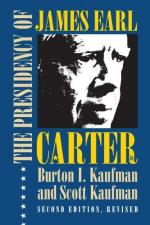|
This section contains 3,560 words (approx. 12 pages at 300 words per page) |

|
When Jimmy Carter was elected the thirty-ninth president in 1976, public faith in elected officials was very low. The long Vietnam War (1954-75) and the Watergate scandal (1972-74), which ultimately resulted in the resignation of President Richard Nixon (1913-1994; see entry in volume 5) from office, dispirited many Americans about their leaders. Inflation (a decline in the value of money) and fuel prices were on the rise; American industries faced increasingly stronger international competition and were responding slowly; and the Cold War, a tense period of strained diplomatic relations, military buildup, and the constant threat of war between the United States and the Soviet Union and their respective allies, was raging. Many people had come to distrust " Washington insiders." Carter, a soft-spoken peanut farmer and former state legislator from Georgia, offered a refreshing alternative to the federal power brokers (influential politicians) in the capital.
Over a remarkable two-year...
|
This section contains 3,560 words (approx. 12 pages at 300 words per page) |

|



